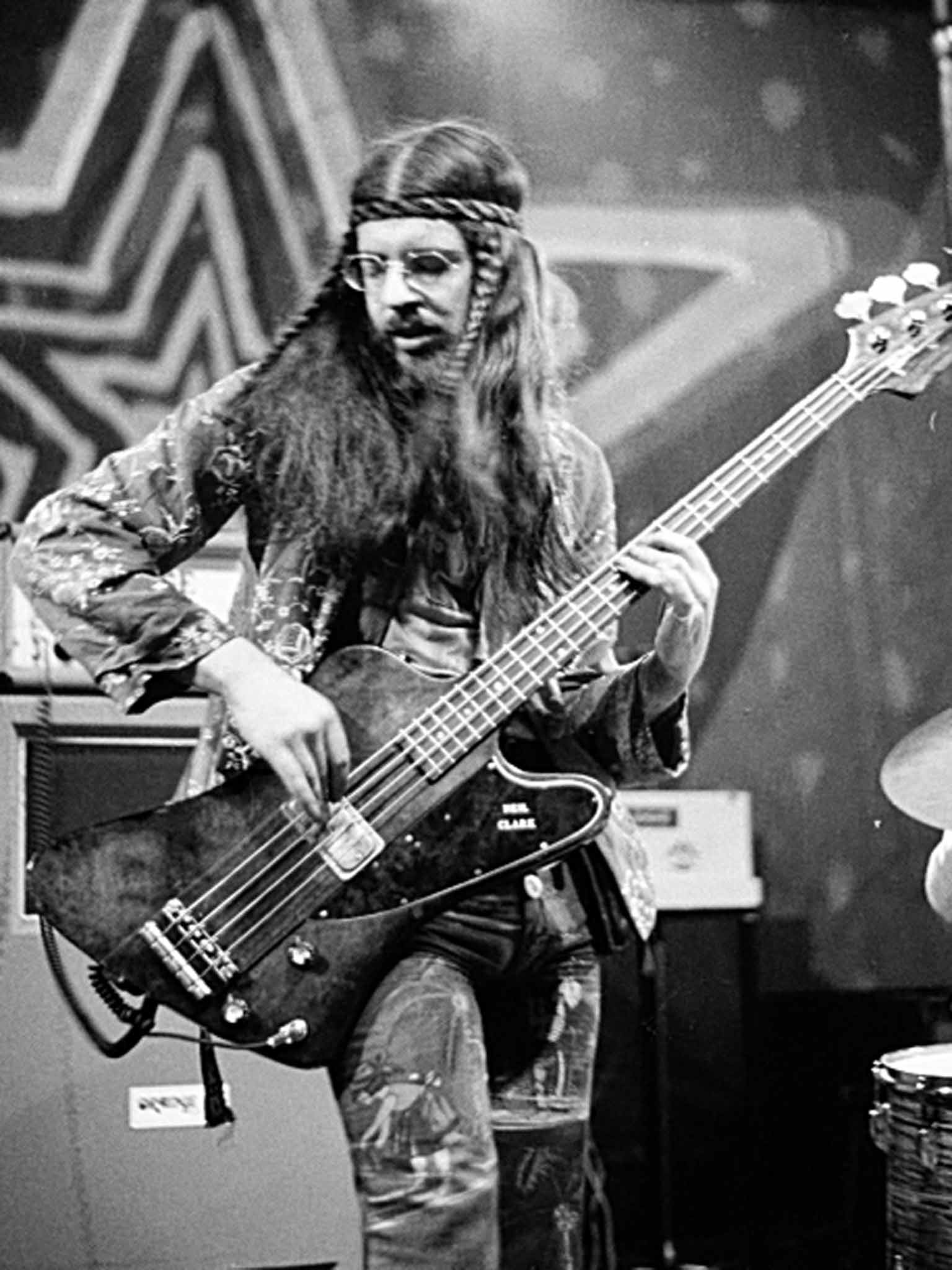Glenn Cornick: Bassist whose solid yet supple playing helped to crystallise the sound and direction of Jethro Tull

With his solid yet supple bass playing, his long hair, Indian headband and glasses, Glenn Cornick was an important component of the first two incarnations of Jethro Tull, the British rock band named after the 18th century agriculturist who invented the seed drill. Within a couple of years they went from near-starvation in Luton to second on the bill to Jimi Hendrix at the Isle of Wight Festival in 1970 and became mainstays of the singles and album charts.
Cornick proved a great visual foil to Ian Anderson, their Fagin-like frontman, who wore a shabby overcoat and played the flute standing on one leg, trademarks that helped the group stand out from their British blues boom contemporaries as their music evolved to embrace classical, jazz and folk influences and grew ever more distinctive and impossible to pigeonhole.
Born in 1947, Cornick traded his acoustic guitar for a bass when he was 16 and played in several local bands in his native town of Barrow-in-Furness and in Blackpool, making his recording debut with the Executives on a single, "Lock Your Door", in 1966. The next year, while holding down a job in the Civil Service, he joined the John Evan Smash, a seven-piece R&B outfit featuring Anderson.
They turned professional and moved south, where the agents Terry Ellis and Chris Wright, later co-founders of Chrysalis Records, could help them secure engagements. But they only got as far as Luton, and were soon down to a nucleus of Anderson, Cornick and new guitarist Mick Abrahams, bolstered by his friend Clive Bunker on drums.
The quartet gigged under a variety of names until they began developing a following at London's Marquee club as Jethro Tull, and then triumphed at the August 1968 Sunbury Jazz And Blues Festival, the forerunner of Reading organised by the Marquee team. By then Ellis had spent £1,000 recording This Was, their debut album, at Sound Techniques studio in Chelsea, and he and Wright cut a deal with Chris Blackwell's Island Records to release what became the first Chrysalis production, and a Top Ten entry, in November 1968.
However, Abrahams left and they drafted Tony Iommi, later of Black Sabbath, for an appearance to promote their first single "A Song For Jeffrey" on The Rolling Stones Rock and Roll Circus the following month. Adding guitarist Martin Barre they recorded Stand Up, famous for its distinctive woodcut style gatefold cover from which the musicians popped up, and the instrumental "Bourée", their memorable adaptation of Bach's Bourrée in E minor underpinned by Cornick's bass, their entrée into mainland Europe.
The album topped the UK charts in summer 1969, consolidated the success of early singles "Love Story" and "Living In The Past", and paved the way for "Sweet Dream" and "The Witch's Promise", their subsequent releases. They also made headway in the US after signing with Reprise and touring with Vanilla Fudge and Led Zeppelin. Cornick kept fastidious diaries of his times with the Tull, which enabled Brian Rabey, author of A Passion Play: The Story Of Ian Anderson And Jethro Tull, to detail their busy schedule in 1969 and 1970, the year they issued the Top Three album Benefit.
"We did a lot of touring in the States playing the Benefit songs and even some things that would later go on to Aqualung," the bassist recalled. "I don't think the band was ever better than we were at that time. At the end of 1970 I was fired. No reason has ever been given."
He was replaced by Jeffrey Hammond, Anderson's friend, a former member of the John Evan Smash and the inspiration for several Tull classics, including "A Song For Jeffrey" and "Jeffrey Goes To Leicester Square". Anderson felt that, by then, Cornick "just wasn't cutting musically or socially with the rest us."
Chrysalis encouraged Cornick to start his own group, Wild Turkey, but it folded after two albums. The bassist joined the German band Karthago and then teamed up with the American-born singer and guitarist Bob Welch, who had just left Fleetwood Mac, in a group named Paris after the city where the collaboration was first mooted. For many years Cornick remained based in California, travelling back to Britain for the occasional Wild Turkey reunion. Along with Abrahams and Bunker he also participated in the recording of the Jethro Tull tribute album To Cry You A Song – A Collection of Tull Tales in 1996.
Paying tribute to Cornick, who died of congestive heart failure, Anderson wrote: "Glenn was a man of great bonhomie and ready to befriend anyone, especially fellow musicians. Always cheerful, he brought to the early stage performances of Tull a lively bravado both as a personality and a musician. His background in the beat groups of the North of England and his broad knowledge of music were always helpful in establishing the arrangements of the early Tull. Glenn was a frequent guest at Tull fan conventions where he would join in with gusto to rekindle the musical moments of the early repertoire."
Glenn Douglas Barnard Cornick, bassist and songwriter: born Barrow-in-Furness, Cumbria 23 April 1947; married Brigitte Martinez (two sons, one daughter); died Hilo, Hawaii 28 August 2014.
Subscribe to Independent Premium to bookmark this article
Want to bookmark your favourite articles and stories to read or reference later? Start your Independent Premium subscription today.

Join our commenting forum
Join thought-provoking conversations, follow other Independent readers and see their replies